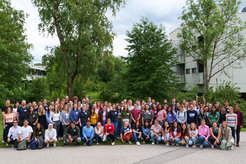IMPRS-ML - A Structured PhD Program for Future Leaders in the Life Sciences
The International Max Planck Research School for Molecules of Life (IMPRS-ML) is the successor of the very successful IMPRS-LS which was first established in 2005. IMPRS-ML is a centre of excellence dedicated to the education and training of the world's most promising young researchers in the areas of biochemistry, structural biology, biophysics, cell biology, systems biology, and computational biology. We believe that true innovation thrives at the intersection of diverse fields. That is why our research school embraces an interdisciplinary approach, seamlessly integrating these different research areas.

The IMPRS-ML is operated by the Max Planck Institute of Biochemistry (MPIB) and works in close collaboration with the Max Planck Institute for Biological Intelligence (MPI-BI), Ludwig-Maximilians-Universität München (LMU) and the Technische Universität München (TUM) (read more below). IMPRS-ML is very proud to be working with the LMU and TUM, which consistently rank amongst Germany’s best universities.
Our Research Areas
At IMPRS-ML, we are dedicated to pushing the boundaries of knowledge. Using advanced methods and technologies in combination with computational approaches, our research groups focus on exploring the structure, function, and dynamics of biomolecules. They investigate how and where these molecules interact in biological systems to generate appropriate responses to environmental cues.
More than 30 distinguished and internationally recognised group leaders actively participate in the PhD program and offer challenging and interdisciplinary projects in three core research areas: Molecular Mechanisms, Biological Systems and Computational Biology and Technology Development.
Our Network and Curriculum
Collaboration and community are at the heart of what we do. As such, the IMPRS-ML serves as a dynamic platform that fosters networking and scientific exchange as an integral part of our program. The research school provides high-level scientific training in a superb research environment with state-of-the-art facilities. Additionally, we offer a comprehensive curriculum, equipping our doctoral researchers for the challenges of a professional career in the global landscape of academia, industry, or beyond.
Our People
With more than 250 doctoral researchers and 30+ faculty members, the IMPRS-ML is one of the largest International Max Planck Research Schools in Germany. Whilst the research school has expanded substantially in the last decade, we are committed to maintaining a close relationship with our doctoral researchers and foster a friendly and welcoming atmosphere.

The diversity of our PhD program, both in terms of people and research, is vital to our success as a leading research school: Ca. 50% of our doctoral researchers are from Germany, while the remaining 50% represent a diverse international cohort, spanning over 40 countries worldwide.
The school works closely with our faculty members and collaborative partners to ensure that our program reflects our doctoral researchers’ needs. We work hard to foster an inclusive environment defined by flexibility and care, allowing our doctoral researchers to reach their full potential. Key to this is the “Thesis Advisory Committee” (TAC), which serves to supervise, guide and mentor doctoral students.
Our successful approach to doctoral training and program organisation speaks volumes. Upon completing their studies, our doctoral researchers make a significant impact, contributing to an average of three publications. What's more, an impressive 20% have their work published in prestigious journals such as Nature, Science, or Cell (ca. 50% thereof as first or co-first author).
Want to join us?
If you are interested in conducting world-class research in a lively and dynamic environment, the IMPRS-ML PhD program is for you! Our program will offer you a unique and unforgettable experience and the fact that 95% of our doctoral researchers would recommend the program to others speaks for itself.
If you are talented, creative and enthusiastic about science, we would be delighted for you to join us at the IMPRS-ML in Munich.
The MPIB is one of the largest institutes of the Max Planck Society, and employs around 750 staff from all around the world. Approximately 350 researchers in 20 research groups focus on studying the structure of proteins - in single molecules, but also in complex organisms. The MPIB is a leading international institute in the field of protein research.
Scientists within the neighboring the MPI-BI are devoted to basic research on topics in behavioural ecology, evolutionary research and neuroscience. Around 500 employees from more than 50 nations study how animal organisms acquire, store, apply and pass on knowledge about their environment in order to find ever-new solutions to problems and adapt to a constantly changing environment.
Both the LMU and TUM are amongst the largest universities in Germany and are recognised as belonging to Europe’s top academic institutions, both in terms of teaching and research. In recognition of this, both universities are recipients of funding from the “Excellence Initiative”, an initiative led by the German government to further the achievements of already outstanding German universities.
Within the LMU, IMPRS-ML cooperates primarily with the Faculty of Biology, the Faculty of Chemistry and Pharmacy including the affiliated GeneCenter, and the Faculty of Medicine. Within the TUM, our main cooperation partners are the TUM School of Natural Sciences and the Faculty of Medicine.
The IMPRS-ML program is overseen by four different entities:
- Steering Committee
- Board
- Coordination Office
- PhD Representation
Steering Committee
The Steering Committee decides on all important issues of the IMPRS-ML including budget, rules and regulations, as well as affiliation of new faculty members. The Steering Committee is composed of four members; two members from the MPIB and two members from our university partners.
- Brenda Schulman, MPIB, speaker
- John Briggs, MPIB, vice speaker
- Veit Hornung, Faculty of Chemistry and Pharmacy, LMU, representative LMU
- Michael Sattler, Faculty of Chemistry, TUM, representative TUM
Board
Members of the IMPRS-ML Board consult and advise the Steering Committee in all organisational matters related to the research school and represent the interests of the institutions and groups they are affiliated with. The board comprises six representatives from the MPIs and participating university faculties and, importantly, also includes one PhD representative responsible for communicating matters important to IMPRS-ML students.
Coordination Office
The Coordination Office is the operative unit of the research school and is responsible for implementing and running the IMPRS-ML program. The Coordination Office is in constant communication with the Steering Committee and the Board and is the primary contact point for the doctoral researchers and PIs. An ‘open door’ policy is promoted to provide swift support if needed.
PhD Representation
IMPRS-ML puts great emphasis on involving our student community in the decision-making processes of the school. The PhD representatives are elected to the school’s Board by the PhD Association once every year. The Coordination Office regularly meets with the PhD representatives to elicit regular feedback and to foster a constructive exchange, thereby ensuring that all students’ needs and interests are heard and met. Thus, the PhD representatives play an active and important role in further developing and improving the research school in general and the curriculum and other activities in particular.
The IMPRS-ML program is based within the very active life science campus “Martinsried-Großhadern” in the southwest of the city of Munich. The campus is easy to reach from the city center with public transport using the U-bahn (underground) or by bus.
The cosmopolitan city of Munich is at the forefront of scientific research in Germany and, situated in the heart of Bavaria, uniquely combines traditions and history with great infrastructure of the modern city. Munich's vibrant and international atmosphere offers a myriad of cultural and entertainment opportunities, whether you enjoy relaxing in a beer garden in summer or trying out one of the many local ski resorts in winter.
Munich benefits from the presence of a large number of research institutes, two worldwide high-ranked universities and a plethora of non-university science-related establishments, alongside a vibrant biotech and pharmaceutical industry. As a result, Munich is not only an exceptional place to live in, but also serves as a bustling hub for research and fruitful collaboration, bridging academia and industry.

